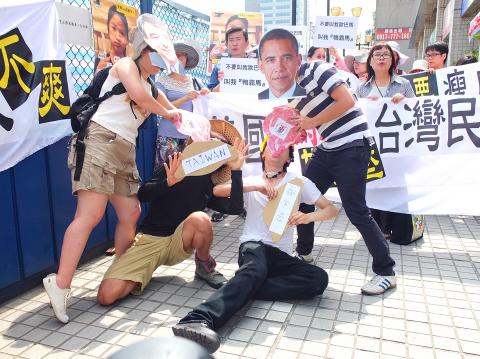A group of activists demonstrated at the American Institute in Taiwan (AIT) yesterday to protest what they called Washington’s high-handed attitude in forcing Taiwan to open its doors to US beef containing residues of the leanness-enhancing drug ractopamine.
The protest was organized by several civic groups, including the National Alliance for Food Safety and Citizen Congress Watch.
The Legislative Yuan is scheduled to vote next week on a package of amendments to the Act Governing Food Sanitation (食品衛生管理法) that would pave the way for the entry under strict conditions of US beef containing residues of the currently banned drug.

Photo: Chen Ping-hung, Taipei Times
The activists sang ballads, performed skits and chanted slogans to highlight their cause.
In one skit, activists acted as US President Barack Obama and AIT Director William Stanton, forcing Taiwanese people to eat US beef contaminated with ractopamine, a drug that is banned in Taiwan and dozens of other countries because of health concerns.
Chen Man-li (陳曼麗), president of the Homemakers United Foundation, a key member of a national alliance for food safety, described the US as one of Taiwan’s allies in the international community.
“Therefore, it should not be coercing Taiwan to import its ractopamine-contaminated beef, putting our people’s health at risk,” Chen said.
Even though Taiwan is an “underdog” in global society, it should not be forced to seek international cooperation at the expense of its people’s health, Chen added.
Cheng Hsiu-chuan (鄭秀娟), head of the Wenshan Community College in Taipei, said the US traditionally regards Taiwan as a friend.
“It should not stray from that tradition by forcing Taiwan to import its drug-tainted beef. We should fight against such a move to win respect. Otherwise, we could be forced to compromise on more things or accept even more humiliating terms in the future,” Cheng said.
Police officers were mobilized to keep the protesters away from the AIT’s main entrance.
The AIT did not send any officials to meet the demonstrators.
The protest lasted for about 15 minutes and ended peacefully.

Alain Robert, known as the "French Spider-Man," praised Alex Honnold as exceptionally well-prepared after the US climber completed a free solo ascent of Taipei 101 yesterday. Robert said Honnold's ascent of the 508m-tall skyscraper in just more than one-and-a-half hours without using safety ropes or equipment was a remarkable achievement. "This is my life," he said in an interview conducted in French, adding that he liked the feeling of being "on the edge of danger." The 63-year-old Frenchman climbed Taipei 101 using ropes in December 2004, taking about four hours to reach the top. On a one-to-10 scale of difficulty, Robert said Taipei 101

Nipah virus infection is to be officially listed as a category 5 notifiable infectious disease in Taiwan in March, while clinical treatment guidelines are being formulated, the Centers for Disease Control (CDC) said yesterday. With Nipah infections being reported in other countries and considering its relatively high fatality rate, the centers on Jan. 16 announced that it would be listed as a notifiable infectious disease to bolster the nation’s systematic early warning system and increase public awareness, the CDC said. Bangladesh reported four fatal cases last year in separate districts, with three linked to raw date palm sap consumption, CDC Epidemic Intelligence

Taiwanese and US defense groups are collaborating to introduce deployable, semi-autonomous manufacturing systems for drones and components in a boost to the nation’s supply chain resilience. Taiwan’s G-Tech Optroelectronics Corp subsidiary GTOC and the US’ Aerkomm Inc on Friday announced an agreement with fellow US-based Firestorm Lab to adopt the latter’s xCell, a technology featuring 3D printers fitted in 6.1m container units. The systems enable aerial platforms and parts to be produced in high volumes from dispersed nodes capable of rapid redeployment, to minimize the risk of enemy strikes and to meet field requirements, they said. Firestorm chief technology officer Ian Muceus said

MORE FALL: An investigation into one of Xi’s key cronies, part of a broader ‘anti-corruption’ drive, indicates that he might have a deep distrust in the military, an expert said China’s latest military purge underscores systemic risks in its shift from collective leadership to sole rule under Chinese President Xi Jinping (習近平), and could disrupt its chain of command and military capabilities, a national security official said yesterday. If decisionmaking within the Chinese Communist Party has become “irrational” under one-man rule, the Taiwan Strait and the regional situation must be approached with extreme caution, given unforeseen risks, they added. The anonymous official made the remarks as China’s Central Military Commission Vice Chairman Zhang Youxia (張又俠) and Joint Staff Department Chief of Staff Liu Zhenli (劉振立) were reportedly being investigated for suspected “serious